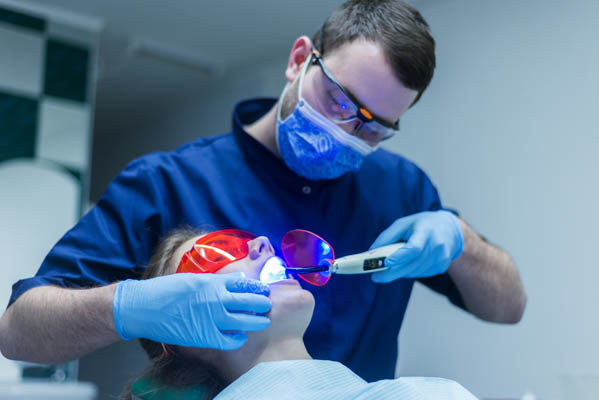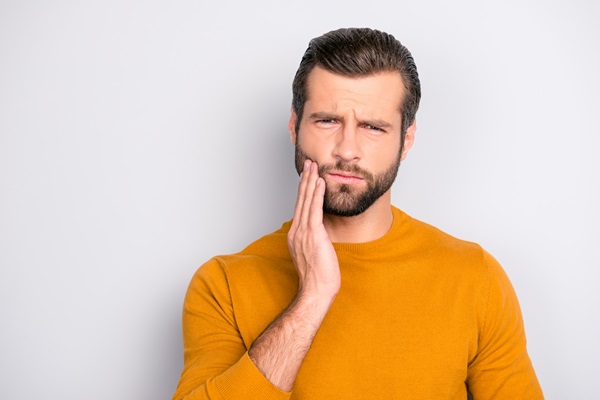When Would Laser Dentistry be Recommended?

Correcting mouth issues with a beam of light might sound like science-fiction, but laser dentistry is a present, common, and effective practice. Dental lasers are less noisy and less invasive than traditional drills. They often cause less anxiety and fear during dental procedures and reduce healing times and pain as well. With all this in mind, dentists increasingly turn to laser technology. Lasers work well for both hard and soft tissue dental procedures.
Applications for laser dentistry
Dental lasers can be useful and beneficial for both the hard and soft tissues of the mouth. The tools and techniques may vary based on which area the dentist is treating.
Hard tissues
The three hard tissues in your mouth are the parts of your teeth known as enamel, cementum, and dentin. Enamel covers the visible parts of teeth, cementum covers tooth roots, and dentin lies underneath the enamel and cementum. Exposed dentin causes sensitive teeth as dentin contains microscopic tubes that lead straight to the soft, nerve-filled pulp inside teeth. Laser dentistry works to seal these tubules and lessen the nerve stimulation that causes these irritating sensations. Lasers can also be used to cut away and reshape these hard tissues and prepare them for fillings, crowns, or bonding.
Dentists also use lasers to whiten teeth. The light both accelerates and enhances the whitening agents placed on your teeth during whitening procedures. Lasers tend to mean less time in the chair for you and greater precision for your dentist as well. They also generally produce a brighter, longer-lasting white smile than whitening without laser assistance.
Soft tissues
Lasers also work well for dental procedures involving softer mouthparts like the tongue, cheeks, lips, and gums. For example, if the tissue underneath your tongue, also known as the frenulum, is too large or tight, it can hamper speech and restrict tongue movement. This condition, called ankyloglossia or tongue-tie, is often treated by using a laser to quickly and relatively painlessly cut the tissue and free the tongue. Ankyloglossia most commonly occurs in infants having trouble breastfeeding or children with speech difficulties, making quick and painless necessary qualities to have. Cutting and shaping any soft tissues with lasers usually reduces swelling and bleeding as well since it is less invasive, relatively quick, and highly accurate.
Many dentists also use lasers to help treat gum disease. In this case, laser therapy works in tandem with traditional deep cleaning, scaling, and root planing treatments. Your dentist can more easily, quickly, and accurately reach and remove diseased gum tissue by laser than by other means. This means less of a chance of the infection returning as well, which makes gingival laser treatment the preferred choice for many patients.
Laser dentistry and patient anxiety
Perhaps one of the most obvious perks of choosing dental lasers is improving the overall comfort level of the patient. Many people have dental anxiety because they are fearful of the pain associated with scalers, drills, and needles. In many situations, lasers can eliminate the need for one or all of these tools, creating an easier and more relaxing treatment experience for the patient
Dental anxiety is a serious issue in the United States. According to the Journal of Dental Hygiene, studies have shown that anywhere between 50% and 80% of adults in this country have some type of anxiety associated with dental treatment and care. Of these people, between 9% and 15% avoid the dentist completely, and receive no professional dental care whatsoever. When dental anxiety prevents a person from getting routine cleanings and checkups, the risks of tooth decay, gum disease, infection, tooth loss, and other serious oral and overall health issues increase. Fortunately, laser dentistry can help make the entire experience more tolerable and may encourage patients who would otherwise avoid the dentist to seek care.
Conclusion
Laser dentistry combines innovative light technologies with other dental practices to make office visits easier and quicker for both you and your dentist. Applying lasers to both hard and soft tissue dental processes tends to be more accurate, faster, and quieter than other traditional methods and typically reduces bleeding, irritation, and healing time as well. Talk to your dentist about laser treatments and decide if laser work is a good option for lighting your way to a healthier, more beautiful smile. If you experience any type of dental anxiety, it may be an excellent alternative for you.
<em>Request an appointment here: <a href="https://sandimassedation.com"> https://sandimassedation.com</a> or call San Dimas Family and Sedation Dentistry at <a href="tel:9097408294">9097408294</a> for an appointment in our San Dimas office.</em>
Check out what others are saying about our dental services on Yelp: Laser Dentistry in San Dimas, CA.
Recent Posts
Curious about laser dentistry? Read on to learn more about this type of treatment. Medical professionals may modify or remove tiny quantities of tissue using lasers. While laser surgery has numerous applications outside of dentistry, the vast majority of patients had never ever heard of laser dentistry until they needed it. Dentists employ lasers for…
The use of laser dentistry to treat a variety of dental issues has been commercially available since 1989. Lasers are a less painful and more efficient option than the drills and tools used in traditional dental treatment procedures. Many patients also feel more comfortable with the sounds and feel of laser treatment. Laser treatment options…
You can enhance your smile with laser dentistry. This high-tech method can restructure your oral structures. Using lasers is a less invasive way to correct your dental issues. It can even improve the esthetic aspect of your dental health. If you want to know how laser dentistry can enhance your smile, here are the facts.A…
More patients than ever before are starting to utilize laser dentistry rather than traditional methods to treat their gum disease. Laser dentistry is an FDA-approved method of treatment that is used as an alternative to traditional treatment methods that require the use of a dental drill and other instruments. Gum disease treatment is a relatively broad…


